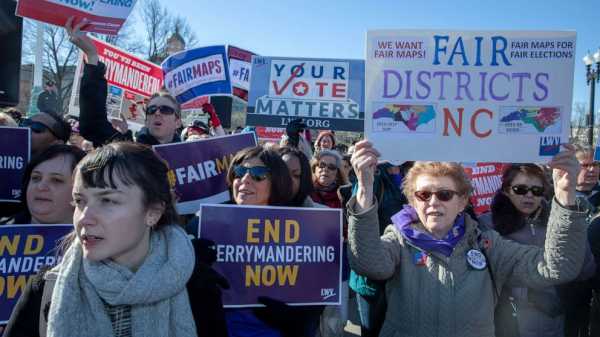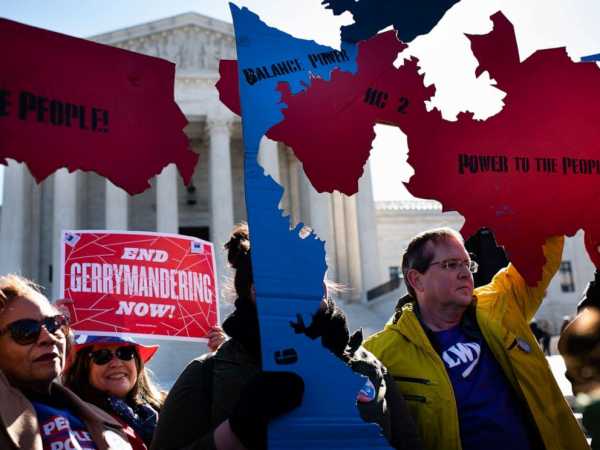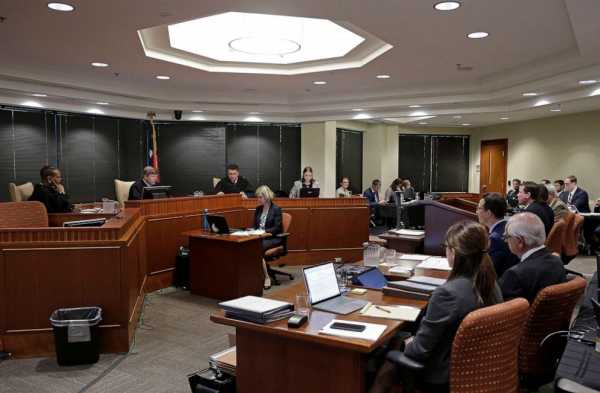
Advocates’ goal is to set the stage for a sweeping state-by-state redistricting effort that will begin in 2021 following conclusion of the 2020 Census. The process, which happens once a decade, determines how voters are represented in state legislatures and Congress, which in turn can affect how billions in state and federal funds are distributed.
(MORE: Uh, how does gerrymandering work again?)
Last month, Obama announced “Redistricting U,” an effort to train volunteer grassroots organizers on “the tools to impact the redistricting process in their state.” Abrams also unveiled a multistate voter protection initiative — “Fair Fight 2020” – to promote voting rights and fair election policies.
“What we’re going to do through Fair Fight 2020 is we’re going to fight back. But we’re fighting early. We’re doing this now,” she said in an August announcement.

Alex Wong/Getty Images, FILE
Stacey Abrams testifies during a hearing before the Constitution, Civil Rights and Civil Liberties Subcommittee of House Judiciary Committee June 25, 2019, on Capitol Hill in Washington, D.C.
The campaigns are partly a response to the U.S. Supreme Court’s June decision to stay out of the politics of gerrymandering once and for all. The court’s conservative majority said federal courts would not police the drawing of electoral maps, leaving it to the states and Congress to develop and enforce the rules.
(MORE: Justices rule courts cannot police partisan gerrymandering )
“Our conclusion does not condone excessive partisan gerrymandering. Nor does our conclusion condemn complaints about districting to echo into a void,” Chief Justice John Roberts wrote in the court’s opinion in Rucho v Common Cause. “Provisions in state statutes and state constitutions can provide standards and guidance for state courts to apply.”
The League of Women Voters effort – dubbed “People Powered Fair Maps” – is to be a nonpartisan campaign active in each of 50 states, the group said. The push will involve mobilizing organizers and advocates to educate the public and lobby state and federal lawmakers, plus pursue possible litigation challenging partisan district boundaries.
“It’s not a one size fits all approach. We are customizing and tailoring our approaches for each state,” said Kase, the League’s CEO.
Advocates say state constitutional provisions guaranteeing “free and fair” elections may be the most fertile ground to rollback discriminatory gerrymandering, since any rulings in state court would likely not be reviewable by the U.S. Supreme Court.

Sarah L. Voisin/The Washington Post via Getty Images, FILE
A Fair Maps Rally was held in front of the U.S. Supreme Court on March 26, 2019, in Washington, D.C.
Just this week, a unanimous three-judge panel in North Carolina struck down that state’s legislative district maps saying they were unfairly drawn to benefit Republicans — in violation of the state constitution.

Gerry Broome/AP, FILE
The honorable Alma Hinton, from left, the honorable Paul C. Ridgeway and the honorable Joseph N. Crosswhite of the Wake County Superior Court preside over the trial of Common Cause, et al v. Lewis, et al in Raleigh, N.C., July 15, 2019.
The “decision offers a framework for other states to evaluate their own redistricting,” said Stanton Jones, a constitutional lawyer at the firm Arnold & Porter in Washington, D.C. “There are a number of other state constitutions around the country with free elections clauses similar or identical to the one in North Carolina.”
A challenge to Pennsylvania’s congressional map brought by the League of Women Voters reached a similar conclusion last year, with that state’s Supreme Court finding the gerrymandered districts violated state law.
The cases show that “state constitutions can be invoked to protect the people of that state,” said Kathay Feng, national redistricting director at Common Cause.
Twenty-eight states have constitutional clauses guaranteeing “free” elections and 13 of those guarantee the right to “free and equal election,” according to the group.
The League plans to also lead campaigns for ballot initiatives in 22 states that would put directly to voters a slate of redistricting reforms and proposed establishment of independent districting commissions.
Kase said the group will also join a coordinated lobbying effort in over 20 states to amend state constitutions to include “free and equal” election protections and enact legislation to enhance transparency in how district boundaries are drawn.
Sourse: abcnews.go.com






